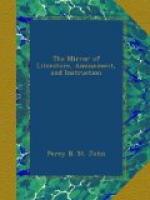Tordenskiold is a name frequently met with in the annals of Denmark. A singular anecdote is connected with one of the bravest individuals who ever bore the name—the renowned Admiral Tordenskiold, of the days of Frederick IV. While he was yet a young and undistinguished naval officer, he chanced to be in the hall of the royal palace at the time that the king, wearied with the flatteries of some courtiers, who were congratulating him on the success of his war with Sweden, exclaimed, “Ay, I know what you will say, but I should like to know the opinion of the Swedes themselves.” Tordenskiold slipped unobserved from the royal palace, hurried to his ship, set sail, and was in an hour on the coast of Sweden. The first sight that caught his eye on landing was a bridal procession. Hastily seizing bride, bridegroom, minister, peasants, and all, he hurried them aboard, and returned to Denmark. Two hours had scarcely elapsed from the moment of the king’s expressing his wish, when Tordenskiold, stepping from the crowd of courtiers who surrounded his majesty, informed him that he had now an excellent opportunity of gratifying his wishes, as Swedes of every class of society were in waiting. The astonished monarch, who had not yet missed the young captain from the hall, demanded his meaning; and on being informed of the adventure, summoned the captives to his presence. After gratifying his curiosity, he dismissed them with a handsome present, and ordered them to be conveyed back to Sweden. The promptness of young Tordenskiold was not forgotten, and he speedily rose to the high admiralship of Denmark, a post which he filled with more glory than any other of his countrymen, either before or since.
* * * * *
The memoirs of Lewis Holberg, which have lately appeared in English, are remarkably curious and interesting. It is not generally known, that this celebrated writer, the Moliere of Denmark, was educated at Oxford, whither he repaired penniless, to secure a good education.
* * * * *
Holberg, Samsoe, and Oehlenschlager are the three dramatic luminaries of Denmark. The best production of Samsoe is the play of Dyveke, produced a few days after his death. Such was the enthusiasm it excited, that the following epitaph was proposed to be inscribed on his tomb, in the public cemetery of Copenhagen:—
“Here
lies Samsoe;
He wrote Dyveke and died.”
* * * * *
The best poet that Sweden has ever produced is Esaias Tegner, the bishop of Wexio, now living. His first production was Axel, a short poem on the adventures of one of those pages of Charles XII. who were sworn to a single life, to be entirely devoted to the fortunes of war. He has struck out great interest by plunging this hero in love, and painting the conflicts between his passion and his reverence for his oath. The words have been translated




